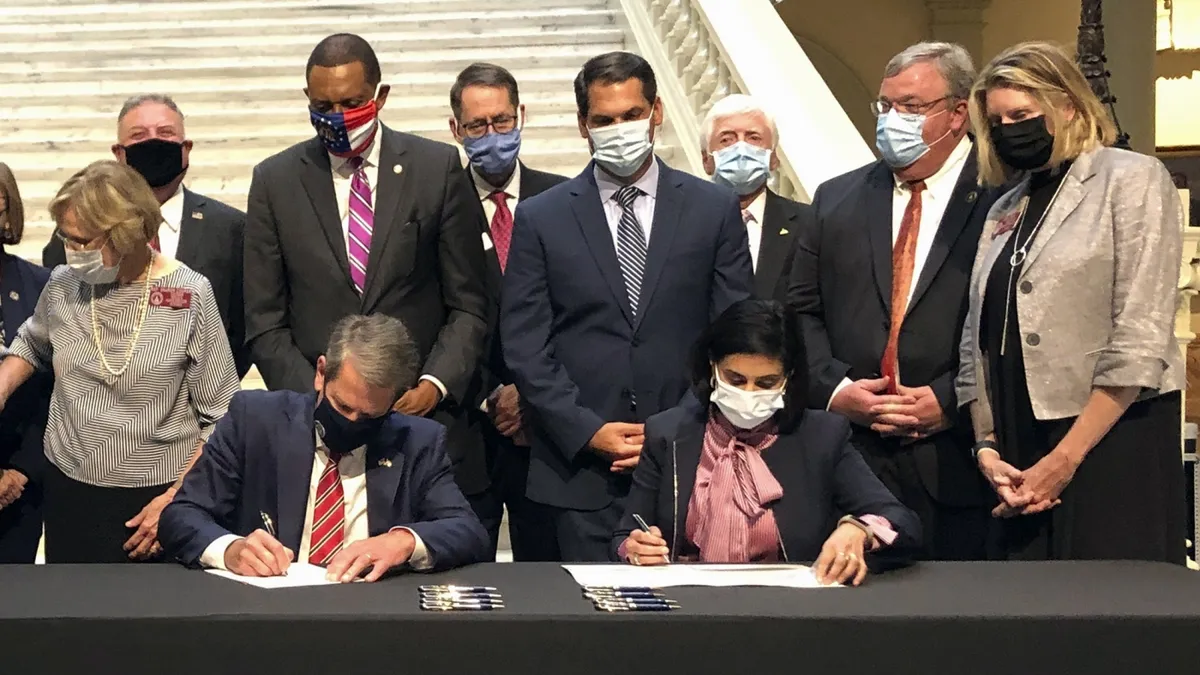
With the recent enactment of the Republicans' comprehensive tax-and-spending bill, millions of Americans who depend on Medicaid are facing new bureaucratic hurdles. This legislation introduces a significant change: for the first time in most states, low-income adults will be required to meet work requirements to retain their health coverage. While some states have previously experimented with this approach, Georgia stands out as the only state currently implementing an active system linking work requirements to Medicaid eligibility. Recipients in Georgia are mandated to report their work status monthly.
Tanisha Corporal, a social worker from Atlanta, initially had no objections to the concept of work requirements. However, her perspective shifted when she left her position at a faith-based nonprofit to launch her own initiative, the Be Well Black Girl Initiative. During this transitional period, she found herself in dire need of health coverage and confronted the complex bureaucratic challenges associated with Georgia's work requirements. “I would have never thought that I was going to run into the challenges that I did, considering my background in human services,” Corporal remarked.
Despite her extensive experience in social services, Corporal encountered unexpectedly severe obstacles with the paperwork and application process. Her struggles reflect a broader concern among health advocates regarding the potential replication of Georgia's system in other states. They argue that the eligibility verification process is fraught with excessive red tape, leading to improper denials and loss of health coverage for many. Starting in 2027, the law will require adults under 65 on Medicaid to report how they utilize their time, mandating at least 80 hours each month spent on work, education, or volunteer activities. Alternatively, individuals can provide documentation for an exemption, such as being a full-time caregiver.
The implementation of verification systems like Georgia's also comes with a hefty price tag. Over the past two years, Georgia has expended more than $91 million in state and federal funds, with over $50 million allocated to developing and maintaining the eligibility reporting system. As of June 30, only 8,078 individuals are enrolled in Georgia's program, known as Pathways to Coverage.
For Corporal, relinquishing health insurance was not an option due to pre-existing medical concerns, including pre-diabetes and a family history of breast cancer. Although she appeared to qualify for the Pathways to Coverage program, which caters to adults who do not meet traditional Medicaid eligibility, the reality was far more complicated. To qualify, applicants must have an income below the federal poverty level and demonstrate part-time work, schooling, or volunteer commitments of at least 80 hours a month.
Corporal, already volunteering extensively, compiled the necessary documents to verify her activities and submitted them through Georgia's online portal, only to face denial. “I was like, this makes no sense,” she stated, emphasizing her qualifications as a master's degree holder in social work. After an arduous eight-month battle involving repeated denials and appeals, Corporal finally secured Medicaid coverage in March, partly due to her public testimony about her experience.
In response to similar issues faced by applicants like Corporal, Georgia's Department of Human Services has acknowledged the challenges and is implementing several technological improvements to enhance the document submission and processing experience. However, even after achieving approval, Corporal remains anxious about maintaining her coverage, as she is still required to recertify her volunteer hours monthly through the same problematic reporting system.
Georgia's decision to establish work requirements predates the recent federal law, necessitating a special waiver from the federal government. The state is currently seeking an extension for this waiver to continue the Pathways to Coverage program, proposing to reduce the re-verification frequency from monthly to annually.
Many health advocates fear that Corporal's experience will not be an isolated case. In Arkansas, a similar attempt to implement work requirements in 2018 yielded negative results, with many applicants unable to navigate the system. Critics argue that the national Medicaid work mandate is unlikely to enhance employment rates, as over two-thirds of Medicaid recipients are already employed. The logistical challenges associated with reporting requirements disproportionately affect low-income individuals who may lack reliable internet access or transportation.
Georgia resident Paul Mikell, who has been enrolled in the Pathways program for nearly two years, echoed these sentiments, recounting his own struggles with the program's web portal. Despite being a licensed truck driver and electrician, Mikell faced multiple hurdles due to technical glitches, further highlighting the systemic issues plaguing Georgia's Medicaid framework.
As the implementation of work requirements unfolds, it is clear that significant reforms are needed to simplify the process and ensure that vulnerable populations can access the vital health coverage they need. The ongoing challenges of the Medicaid program serve as a stark reminder of the complexities faced by low-income individuals navigating the system.